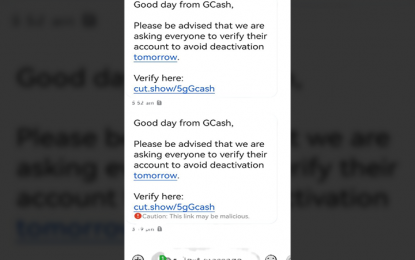
SCAM MESSAGE. A screen capture of a scam message circulating in messaging platforms that seeks to bait users by pretending to be from GCash – a Filipino mobile payments service. Senator Joel Villanueva on Thursday (June 20, 2024) urged for a review of the available mechanisms against text scams amid their continued proliferation. (Screen capture courtesy of CICC)
MANILA – Senator Joel Villanueva is seeking a review of the available mechanisms against text scams amid their continued proliferation.
In Senate Resolution No. 1057 that Villanueva filed on Thursday, he noted that text scams continue to proliferate, with some people receiving up to five text messages from scammers daily, despite the reporting system established by the National Telecommunications Commission (NTC) and telecommunication entities, as well as the provisions and penalties imposed under the SIM Registration Act.
"In addition to blocking reported SIMs and determining the persons and entities behind these scams, the NTC and other government agencies must also look into: the mode of acquisition of cellular phone numbers (e.g., unreported data breach); the alleged sale of personal data; and the alarming use of illegal equipment to simulate numbers," Villanueva said.
Based on the equipment seized by authorities during raids, Villanueva pointed out that scammers are using cell-site simulators to spoof mobile numbers and deceive users.
"Scammers are also increasingly using cell site simulators, or stingrays, or international mobile subscriber identity catchers to spoof or mimic mobile numbers to deceive users into thinking that they are receiving legitimate text messages from legitimate companies," he said.
"These text messages contain fake links that are used to extract information or money from users," he added.
Villanueva noted that from January to May 21, 2024, the NTC received 36,776 complaints and successfully blocked all reported SIMs.
Of the total, 45 percent were call and text scams; 30 percent contained game links; while the remaining 25 percent contained bank links and other forms of fraud and harassment.
According to the NTC, it has also successfully acted on a total of 97,553 and 35,072 complaints in 2023 and 2022, respectively. (PNA)
